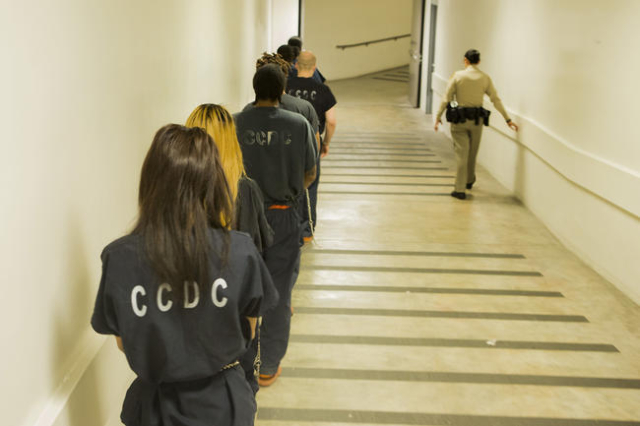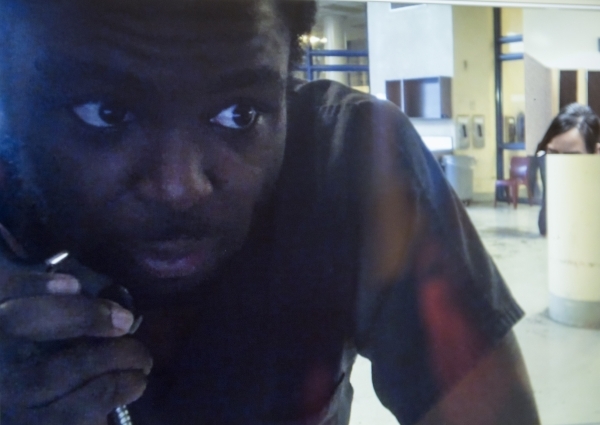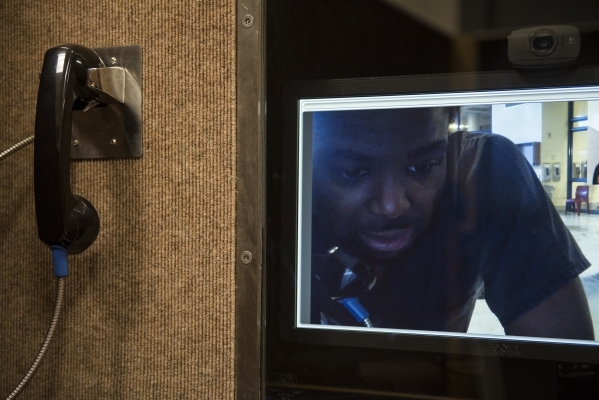Judge OKs deadlines for ensuring inmates get mental health treatment
Nevada will have to eliminate the wait list of those stuck at the Clark County Detention Center waiting for mental health treatment by March 1, 2016, and those waiting in jails across the state by April 1, 2016, according to an amended federal settlement approved Tuesday by a federal judge.
If the Silver State fails to clear the wait list in Clark County by March 1 or fails to implement other enforcement requirements, a monitor would be appointed at the state's expense, according to the five-year amended settlement approved by Federal Judge Miranda M. Du.
"Defendants shall take all necessary steps to provide prompt restorative treatment to incapacitated detainees in Nevada as soon as possible," according to a copy of the settlement. "Defendants acknowledge that they are legally required to provide prompt restorative treatment, regardless of the fact that the number of incompetent detainees may vary over time and regardless of funding, staffing, and logistical challenges."
On Oct. 28, Du found Nevada to be in violation of a 2014 federal lawsuit settlement to provide prompt treatment to mentally ill inmates languishing in jail.
The 2014 settlement phased in time frames for the state to provide treatment. It started with 21 days, which later tightened to 14 days and on Sept. 1, decreased to seven days. But the state often didn't meet the time frames, leaving many stuck in jails waiting to be transported for treatment.
On Nov. 19, the Stein Forensic Unit became the state's second facility to treat mentally ill offenders to help restore their competency to stand trial. It's the equivalent of Lake's Crossing Center in Sparks, which has struggled with capacity.
Clark County Deputy Public Defender Christy Craig said state officials had been very forthcoming.
"I have very high hopes that this proposed plan and the opening of Stein, and all the beds that have been added, will be the ultimate solution," she said on Tuesday of the ongoing problem. The state has been sued twice in the last 10 years for the same issue.
State officials are confident they will meet the requirements under the amended settlement, said Chrystal Main, spokeswoman for the state Department of Health and Human Services.
They don't anticipate the need for additional resources, she said.
Du in October ordered state officials to work with the Clark County public defender's office, which filed the second lawsuit in the matter, to create a plan for the state to come into compliance.
Both parties had been meeting to develop a resolution that would lead to common ground.
"The court finds that the proposed (settlement) order is fair, reasonable, and in the public interest," according to minutes of the court proceeding Tuesday.
Under the new settlement, if the wait list in Clark County has not been reduced to three by Feb. 1, 2016, the state will have to open 20 additional beds in Southern Nevada no later than March 1, 2016.
A monitor would be appointed if the state doesn't reduce the wait list in Clark County to zero by March 1, 2016, or at any time after, or if the wait list ever exceeds 10 per month for more than 10 days of two executive months, according to the settlement.
Within three business days, state officials would need to notify the Clark County public defender's office if any of those triggering conditions arise.
"The parties shall subsequently meet and confer and submit a joint plan or separate plans for appointment of a monitor to the court by April 1, 2016, or 30 days after the date the Clark County waiting list exceeds 10 for the second consecutive month," according to the settlement.
Assuming the state maintains the waiting list at zero, state officials should provide a quarterly report to the public defender's office for a period of five years from the effective date of the settlement. The state should resume to monthly reports if the Clark County waiting list ever exceeds 10 until the wait list is eliminated, according to the settlement. State officials will also have to compile historical data of commitments and the wait lists of detainees from 2008 to November 2015, and provide that information to the public defender's office by Jan. 1, 2016, among other reporting requirements.
Craig said the amended settlement marks a good accomplishment, but it doesn't solve all the issues facing the mentally ill with criminal cases.
"There's a multitude of problems," she said.
Contact Yesenia Amaro at yamaro@reviewjournal.com or 702-477-3843. Find her on Twitter:@YeseniaAmaro




















